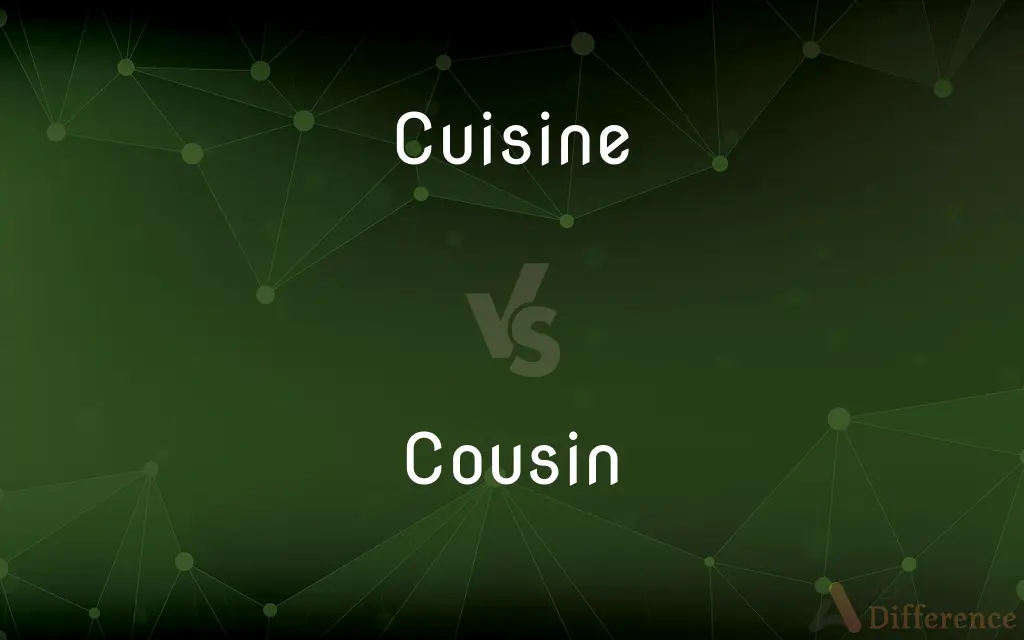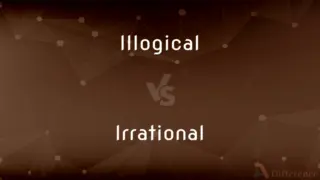Cuisine vs. Cousin — What's the Difference?
By Urooj Arif & Fiza Rafique — Updated on March 19, 2024
Cuisine refers to a style or method of cooking, especially characteristic of a particular country or region, while cousin denotes a relative descended from one's common ancestor.

Difference Between Cuisine and Cousin
Table of Contents
ADVERTISEMENT
Key Differences
Cuisine encompasses the various cooking practices, traditions, and recipes associated with a specific culture, country, or region. It reflects the ingredients, techniques, and dishes that are unique to or prevalent in a particular area. For example, Italian cuisine is renowned for its emphasis on pasta, tomatoes, and olive oil. On the other hand, a cousin is a family member who shares a common ancestor with another individual, usually one or more generations removed. For instance, a first cousin is the child of one's aunt or uncle.
While cuisine contributes to cultural identity and social traditions through food, sharing meals, and culinary practices, cousins are part of an individual's extended family tree. They can play a significant role in one's familial and social life, participating in family gatherings, sharing childhood memories, and maintaining familial bonds.
Cuisine can vary widely even within a single country, showcasing regional specialties and diverse culinary influences. For example, the varied climates and historical influences in the United States have led to a range of regional cuisines, from the seafood-based dishes of New England to the spicy flavors of the Southwest. Cousins, however, are classified based on their generational distance from oneself, with terms like first cousin (sharing grandparents), second cousin (sharing great-grandparents), and so forth, to describe these relationships.
The development and evolution of a cuisine are influenced by factors such as geography, climate, history, and trade, which determine the availability of ingredients and the adoption of different cooking methods. Family relationships, including those with cousins, are shaped by genealogy, cultural practices, and personal interactions, which define the closeness and dynamics within an extended family.
Understanding a region's cuisine can provide insights into its culture, history, and social practices, making food an important aspect of cultural exchange and exploration. Family relationships, such as those with cousins, highlight the complexities of kinship, inheritance, and the social fabric that connects individuals within a family.
ADVERTISEMENT
Comparison Chart
Definition
Style or method of cooking, especially of a particular country or region.
A relative descended from a common ancestor, typically one generation removed.
Role
Contributes to cultural identity and traditions through food.
Part of one's extended family tree, contributing to familial and social connections.
Variation
Varies by region, reflecting local ingredients and cultural influences.
Classified by generational distance, such as first or second cousin.
Influencing Factors
Geography, climate, history, and trade influence its development.
Genealogy, cultural practices, and personal interactions shape relationships.
Cultural Significance
Provides insights into a region's culture, history, and social practices.
Highlights the complexities of kinship and the social fabric within families.
Compare with Definitions
Cuisine
Cooking style of a region.
Mediterranean cuisine is known for its healthy use of olive oil and fresh produce.
Cousin
A familial relation.
A first cousin is the child of one's aunt or uncle.
Cuisine
Influenced by geography and history.
Coastal regions often have cuisine centered around seafood.
Cousin
Can be close or distant.
Second cousins share great-grandparents but may not have a close relationship.
Cuisine
Reflects cultural identity.
Japanese cuisine emphasizes fresh, seasonal ingredients and meticulous presentation.
Cousin
Classification by generational distance.
Removed indicates cousins from different generations.
Cuisine
A form of cultural expression.
French cuisine is celebrated for its culinary techniques and has influenced global dining.
Cousin
Part of extended family gatherings.
Cousins frequently reunite during holidays and family events.
Cuisine
Can be diverse within a country.
Indian cuisine varies significantly from north to south.
Cousin
Plays a role in family dynamics.
Cousins often share childhood memories and familial traditions.
Cuisine
A cuisine is a style of cooking characterized by distinctive ingredients, techniques and dishes, and usually associated with a specific culture or geographic region. Regional food preparation traditions, customs and ingredients often combine to create dishes unique to a particular region.A cuisine is primarily influenced by the ingredients that are available locally or through trade, they can even be made into distinct ingredients themselves when they become popular within a region, take for example Japanese rice in Japanese cuisine and New Mexico chile in New Mexican cuisine.
Cousin
Commonly, "cousin" refers to a "first cousin", a relative whose most recent common ancestor with the subject is a grandparent. More generally, in the lineal kinship system used in the English-speaking world, a cousin is a type of familial relationship in which two relatives are two or more familial generations away from their most recent common ancestor.
Cuisine
A characteristic manner or style of preparing food
Spanish cuisine.
Cousin
A child of one's aunt or uncle. Also called first cousin.
Cuisine
Food; fare.
Cousin
A relative descended from a common ancestor, such as a grandparent, by two or more steps in a diverging line.
Cuisine
A characteristic style of preparing food, often associated with a place of origin.
French cuisine is considered to be one of the world's most refined and elegant styles of cooking.
The restaurant is noted for its excellent cuisine.
Cousin
A member of a kindred group or country
Our Canadian cousins.
Cuisine
(uncountable) culinary art: The art of preparing food, generally.
Cousin
Something similar in quality or character
"There's no mistaking soca for its distant Jamaican cousin, reggae" (Michael Saunders).
Cuisine
A kitchen or cooking department.
Cousin
Used as a form of address by a sovereign in addressing another sovereign or a high-ranking member of the nobility.
Cuisine
The kitchen or cooking department.
Cousin
The child of a person's uncle or aunt; a first cousin.
I think my cousin is a good man.
Cuisine
Manner or style of cooking.
Cousin
(archaic) A kinsman.
Cuisine
The practice or manner of preparing food or the food so prepared
Cousin
Any relation who is not a direct ancestor or descendant but part of one's extended family; one more distantly related than an uncle, aunt, granduncle, grandaunt, nephew, niece, grandnephew, grandniece, etc.
Cousin
(obsolete) A title formerly given by a king to a nobleman, particularly to those of the council. In English writs, etc., issued by the crown, it signifies any earl.
Cousin
(figurative) Something kindred or related to something else.
Cousin
A member of the British intelligence services (from an American perspective) or of the American intelligence services (from a British perspective).
Cousin
One collaterally related more remotely than a brother or sister; especially, the son or daughter of an uncle or aunt.
Thou art, great lord, my father's sister's son,A cousin-german to great Priam's seed.
Cousin
A title formerly given by a king to a nobleman, particularly to those of the council. In English writs, etc., issued by the crown, it signifies any earl.
My noble lords and cousins, all, good morrow.
Cousin
Allied; akin.
Cousin
The child of your aunt or uncle
Common Curiosities
Can cuisine influence cultural identity?
Yes, cuisine is a significant aspect of cultural identity, reflecting a region's history, traditions, and social practices.
How is a first cousin related to me?
A first cousin is the child of your aunt or uncle, sharing a set of grandparents with you.
How does geography affect cuisine?
Geography influences the availability of ingredients and culinary practices, shaping regional cuisines.
Can someone have cousins they've never met?
Yes, especially in large or geographically dispersed families, it's possible to have cousins one has never met.
What's a "cousin once removed"?
A "cousin once removed" is either the child of your cousin or your parent's cousin, indicating a one-generation difference.
What defines a cuisine?
Cuisine is defined by the cooking styles, practices, and traditions characteristic of a specific region or culture.
Can cuisine reflect a country's history?
Yes, a region's cuisine can reflect its historical influences, such as colonization, trade routes, and immigration.
What does "second cousin" mean?
Your second cousin is the grandchild of your grandparent's sibling, sharing great-grandparents with you.
How do culinary traditions get passed down?
Culinary traditions are often passed down through generations within families and communities, preserving cultural heritage.
Are cousins considered immediate family?
Cousins are typically considered extended, rather than immediate, family members.
How are new cuisines created?
New cuisines can emerge from the blending of culinary traditions, migration, and innovation in cooking methods and ingredients.
How do people discover their cousins?
People can discover cousins through family gatherings, genealogical research, and nowadays, through DNA testing.
Is it common to have close relationships with cousins?
It varies by family and culture; some people have close relationships with their cousins, while others may not.
Does cuisine play a role in celebrations?
Cuisine is central to many celebrations and festivities, often featuring traditional dishes and culinary customs.
What role do cousins play in one's life?
The role of cousins can vary widely; they can be close confidants, occasional acquaintances, or simply part of one's extended family network.
Share Your Discovery

Previous Comparison
Illogical vs. Irrational
Next Comparison
Resistance vs. CapacitanceAuthor Spotlight
Written by
Urooj ArifUrooj is a skilled content writer at Ask Difference, known for her exceptional ability to simplify complex topics into engaging and informative content. With a passion for research and a flair for clear, concise writing, she consistently delivers articles that resonate with our diverse audience.
Co-written by
Fiza RafiqueFiza Rafique is a skilled content writer at AskDifference.com, where she meticulously refines and enhances written pieces. Drawing from her vast editorial expertise, Fiza ensures clarity, accuracy, and precision in every article. Passionate about language, she continually seeks to elevate the quality of content for readers worldwide.
















































